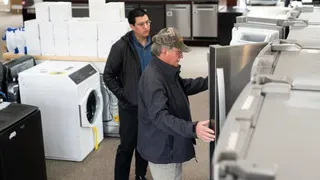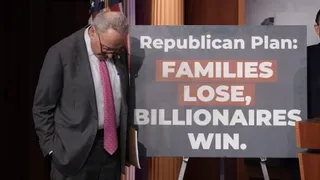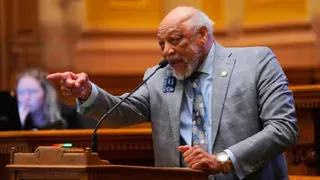May 11, 2009
Vatican Rep: No Catholic Should Vote for Marriage Equality Supporter
Kilian Melloy READ TIME: 5 MIN.
Catholic officials have launched a fresh initiative to influence secular law according to the religious teachings of the Catholic Church, with marriage equality firmly in their sites.
Church officials in Maine, the fifth and most recent state to offer marriage equality to gay and lesbian families, seek to bring those families' rights to a popular vote, in hopes of seeing marriage equality repealed, as happened in California last year when, after a bruising and extremely expensive campaign to rescind family rights for gays and lesbians, voters narrowly passed Proposition 8.
An Associated Press story from May 10 quoted Maine's Secretary of State, Matthew Dunlap, as saying, "The wheels are turning," with marriage foes planning to collect signatures toward putting family rights on the ballot.
If enough signatures are gathered, the article said, the petition will go to election officials--and it won't be necessary for voters to weight in before marriage equality is suspended in Maine: as soon as the petition is in the hands of election officials, gay and lesbian families will lose the right to proceed with their legal weddings.
That may mean that marriage equality in Maine, set to begin in September, is stymied before, or just as, it takes effect.
A popular vote on the rights of gay and lesbian families could follow as soon as November of this year, the article said.
If not, the vote could take place in mid-2010.
One leader of the anti-marriage push is Marc Mutty, who the article said is affiliated with the church Diocese in Maine.
Mutty indicated that a frenzy similar to the one surrounding Prop. 8 could descend on Maine, saying, "I expect a number of interests to come forward, including a number of national interests."
California was rocked as both sides of the marriage issue found support from out-of-state interests; most notably, the Mormon church issued a directive to its membership to support the effort to outlaw marriage equality in California, leading to a tidal wave of Mormon money and volunteers pouring into the state.
Both sides aired TV and radio ads and courted the voters through rhetoric and rumor; among other things, each side accused the other of vandalism and intimidation tactics.
Several studies released after the vote on Prop. 8 found that the heated debate over the matter put strain on gay families as well as gay individuals, and led to deep discord in families as heterosexual siblings of gay marrieds expressed support for the revocation of marriage rights.
The children of gay families also suffered from anxiety, and communities were riven, the studies found.
The AP article quoted Portland Diocese head Bishop Richard Malone as saying, "We believe that the vast majority of Maine's people believe that marriage is the union of one man and one woman, and that calling same-sex relationships marriage doesn't make them so."
Archbishop Raymond Burke spoke out against marriage for gays and lesbians in general, according to an article posted May 11 at socially conservative site CNS News.com.
Burke, who serves the Vatican's the Supreme Tribunal of the Apostolic Signatura as a prefect, referred to secular laws that contradict church stances as "evil," including family equality for gays and lesbians, abortion rights, and an individual's right to choose his or her own time of death in the face of incurable disease and a loss of quality of life.
Burke also said that Catholic voters should not support politicians who espouse views or support laws contrary to church teachings, even if the politician in question supports many other important policies.
Burke spoke broadly of "natural moral law," and condemned politicians' saying that their own personal beliefs had to be secondary to the will of their constituents.
"How often do we hear Catholic legislators who vote in favor of anti-life and anti-family legislation claim that they are personally opposed to what the legislation protects and fosters, but that they as public officials may not allow religious beliefs to affect their support of such legislation?" Burke wondered aloud.
"How often do we hear fellow Catholics supporting candidates for office, who are anti-life and anti-family, because of political-party loyalties or for reasons of other policies and programs supported by the candidate, which they deem to be good?" the Archbishop went on to ask.
"How often is such thinking justified by the claim that religious faith is a purely private matter and has no place in the public forum?"
Argued the Archbishop, "On the contrary, the common good depends upon the active engagement of religious faith in the public forum."
Burke cited a document written by Pope John Paul II that, Burke said, set out the necessity of refusing to vote for politicians who support secular laws that maintain a woman's right to choose, or support marriage equality.
"The Servant of God Pope John Paul II, in his Encyclical Letter Evangelium Vitae, addresses at length the question of cooperation in evil which violates the dignity of innocent human life.
"He concludes that the legislator could vote for the legislation, while his own opposition to procured abortion remains clear, for his vote does not in fact represent an illicit cooperation with an unjust law, but rather a legitimate and proper attempt to limit its evil aspects," the Archbishop continued.
"In an analogous manner, as voters, we are often faced with a choice among candidates who do not fully oppose unjust laws.
"In such a case, we must choose the candidate who will most limit the evil effects of unjust laws."
Unless that politician's platform includes support for freedom of reproductive choice or family equality, said the Archbishop, declaring, "there is no element of the common good, no morally good practice, which a candidate may promote and to which a voter may be dedicated, which could justify voting for a candidate who also endorses and supports the deliberate killing of the unborn, euthanasia or the recognition of a same-sex relationship as a legal marriage.
"The respect for the inviolable dignity of innocent human life and for the integrity of marriage and the family are so fundamental to the common good that they cannot be subordinated to any other cause, no matter how good it may be."
Back in Maine, Bishop Richard Malone resorted to time-tested anti-gay rhetoric, calling marriage equality a "dangerous sociological experiment" and implying that marriage for gays and lesbians would not be as socially valuable as marriage for heterosexuals, which the Bishop said had "served as the cornerstone of society" for thousands of years.
Echoing controversial claims that the anti-marriage side had made in the Proposition 8 debate, Malone also gave voice to speculation that marriage equality would lead to school children hearing about gays and their marriages to one another in the classroom.
The AP article noted that marriage equality proponents are already taking note and preparing to defend the state's exiting law.
Said EqualityMaine's Betsy Smith, "Now that it is the law of the state of Maine, we will protect that law."
Faced with a the prospect of a Proposition 8-style struggle, Smith added, "It's disappointing we would need to raise a lot of money to protect a law in Maine."
Maine voters have stripped gay and lesbian fellow citizens of rights before; in 1998, a Christian-led effort to repeal an anti-discrimination law sent the state's gay and lesbian citizens back to square one.
But in 2005, a similar effort to repeal an anti-discrimination law that benefited gays and lesbians was turned away by voters.
Yet another attempt to strip gays and lesbians in Maine of civil protections, and to bar them from family equality avenues such as marriage and adoption rights was dead before it got started, when signature gatherers drew fewer than 5,000 signatures; they would have needed 15,000, the AP article said.
Kilian Melloy serves as EDGE Media Network's Associate Arts Editor and Staff Contributor. His professional memberships include the National Lesbian & Gay Journalists Association, the Boston Online Film Critics Association, The Gay and Lesbian Entertainment Critics Association, and the Boston Theater Critics Association's Elliot Norton Awards Committee.







